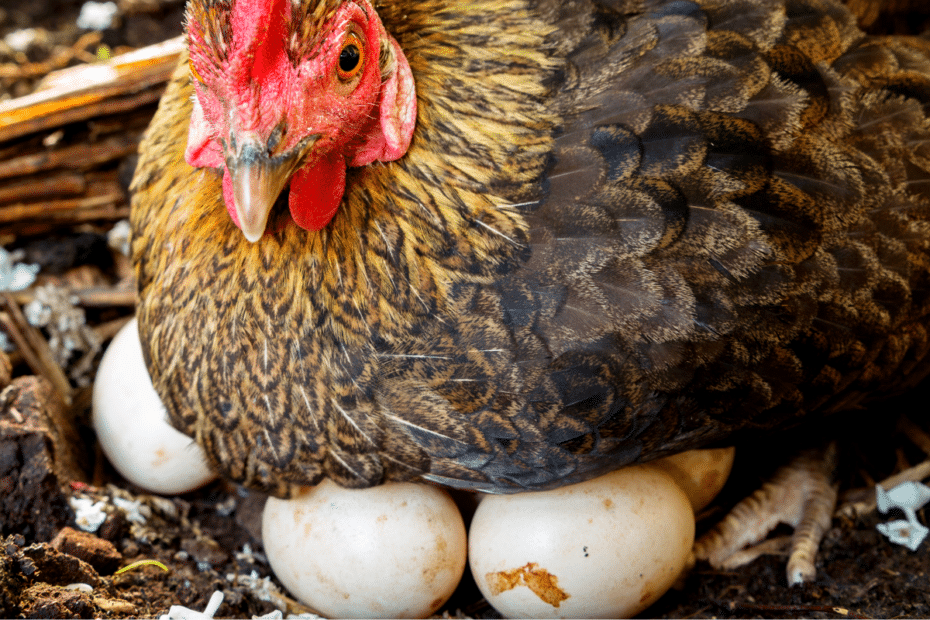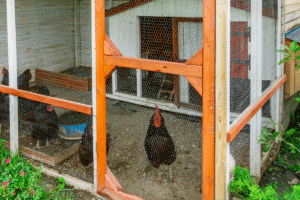Winter presents several challenges for chicken owners due to shorter days and colder temperatures, which can lead to a decrease in egg production. By addressing insulation, lighting, temperature maintenance, and nutrition needs, you can ensure your hens continue laying eggs even during the cold season.
Contenus de la page
Ensure proper insulation and draft protection for the chicken coop
Chickens generally tolerate cold weather well, but drafts and low temperatures in the coop may affect their comfort and hinder egg production. To optimize the environment inside the chicken coop, focus on protecting critical areas, such as the roof, floor, and openings.
The roof
Use a thick tarp or waterproof cover to protect the roof against snow and heavy rain, preventing leaks and retaining warmth inside. Check the cover regularly to ensure it’s in good condition and effectively shielding your chickens from harsh weather.
The floor
Add a thick layer of insulating material like straw, dead leaves, or wood shavings on the floor. This extra padding will keep the chickens’ feet warm, maintain cleanliness, and ensure that any laid eggs remain clean until collected.
Openings
Seal unwanted drafts by closing small openings with insulation materials while still providing adequate ventilation to reduce humidity levels within the coop. Doing this helps maintain a comfortable environment and prevent respiratory issues in your flock.
Provide adequate lighting for increased egg production
Although chickens are resilient against cold weather, they’re more active and productive when they don’t need to rely heavily on their energy reserves to stay warm, especially when temperatures drop below 10°C. In winter months, introducing additional lighting serves a dual purpose: it extends daylight hours, encouraging egg-laying while also helping maintain minimum coop temperatures, enhancing comfort and productivity.
Choose energy-efficient lighting solutions
Using energy-efficient LED bulbs can help cut down on electricity costs without compromising your chickens’ welfare. Opt for timers that automatically turn lights on and off according to predetermined schedules to ensure your hens receive sufficient light exposure throughout the day.
Maintain coop temperatures for comfort and productivity
One of the best ways to encourage egg production during winter is to keep the chicken coop at a constant temperature above 10°C. This approach will prevent your flock from using up too much energy staying warm, allowing them to allocate these resources towards laying eggs instead. Consider employing supplementary heat sources such as a heater or heating lamps, ensuring your coop remains cozy throughout wintry months.
Monitor temperature and humidity levels
Regularly check temperature levels in the coop to ascertain if any adjustments need to be made to the settings. Additionally, install a hygrometer alongside a thermometer to gauge humidity levels, which ideally should fall between 40-60% for optimum chicken health.
Nutrition and diet adjustments for enhanced winter egg production
Feeding plays a crucial role in your chickens’ overall well-being and productivity, particularly throughout winter when they require extra energy to combat frigid conditions. In addition to regular feed, consider supplementing their diet with high-energy treats such as sunflower seeds or dried mealworms.
Supplement vitamin D
Adding a vitamin D supplement during the cooler months helps make up for the lack of sunlight exposure in your hens’ daily routine. Vitamin D plays an essential role in calcium metabolism, which directly impacts eggshell quality.
By combining stable warmth, adequate lighting, and enriched nutrition, you can significantly boost your hens’ egg production in April, doubling their output even at a traditionally low-producing time of the year.
In summary, paying attention to insulation, lighting, temperature maintenance, and proper nutrition ensures optimal conditions for egg-laying during harsh winter seasons. In return, you’ll enjoy a continual supply of fresh eggs without compromising your flock’s health and happiness.


